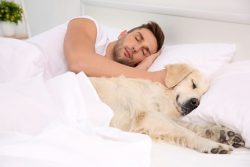The Pros and Cons of Sleeping with Your Pet
July 2, 2023
According to one estimate, more than one-third of homes in the U.S. have a dog, while close to one-fourth have a cat. Indeed, it is obvious that our culture places a very high value on our furry companions. Some people spoil their pets by letting them sleep in their bedroom; many even sleep in the same bed as their cat or dog. But have you ever wondered about the pros and cons of sleeping with your pet if you have sleep apnea? This blog post explains what you should know.
Possible Advantages of Sleeping with a Pet
A study conducted by the Mayo Clinic was set up with the goal of learning how dogs affect sleep. The human participants were all in good health and free of sleep disorders. It was found that the people enjoyed the highest quality of sleep when a human partner was in their bed with them. They had medium-sized dog in the room, but the animal was not allowed on the bed.
Other research indicates the many people enjoy enhanced feelings of warmth and security when they sleep with a pet. These positive emotions may promote higher-quality sleep. This might be especially applicable to people who do not share a bed with a human partner, including children, single people, and bereaved individuals.
Disadvantages of Sleeping with a Pet
The Mayo Clinic study mentioned in the previous section found that having a pet in bed can interfere with the efficiency of a person’s sleep. (Sleep efficiency is a ratio that compares time asleep with time spent in bed.) However, the disruption was not severe for most people.
If you have obstructive sleep apnea (OSA), there may be additional downsides to sleeping with your cat or dog. If you have any allergies to pet dander, having your furry friend in your bedroom at night could contribute to nasal congestion, mouth breathing, and respiratory irritation. Such issues could exacerbate your OSA symptoms.
How to Minimize Your Pet’s Impact on Your Sleep
There is no right or wrong answer when it comes to whether you should sleep with your pet. If you decide to do so, though, you should take a few steps to minimize your pet’s impact on the quality of your sleep. Here are some tips to help you out:
- Do not allow your pet on your bed. Rather, create a cozy spot for them to sleep in another part of your bedroom.
- Keep your bedroom as clean as possible. Vacuuming your carpet a few times each week, regularly washing your bedding, and washing your pet’s bed are all important. If you have a dog, they should receive regular baths.
- Consider taking an allergy medication. If pet dander bothers you, your primary care practitioner may be able to help.
- Consistently use your sleep apnea treatment. If you have a CPAP machine, you may need to implement precautions to ensure that your pet does not chew on the wires or trip over them. A custom oral appliance from a dentist may be a safer option.
Pets are delightful, but they are not always good for sleep. A few simple adjustments may help both you and your animal to enjoy restful nights.
Meet the Practice
Dr. Kenneth Mogell is an experienced sleep dentist who has been providing oral appliance therapy for more than 10 years. If you suspect that you have OSA, or you are looking for an effective CPAP alternative, he and our team are ready to serve you. Contact any of our convenient locations via our website, or call our Melbourne office at 844-686-0696.
